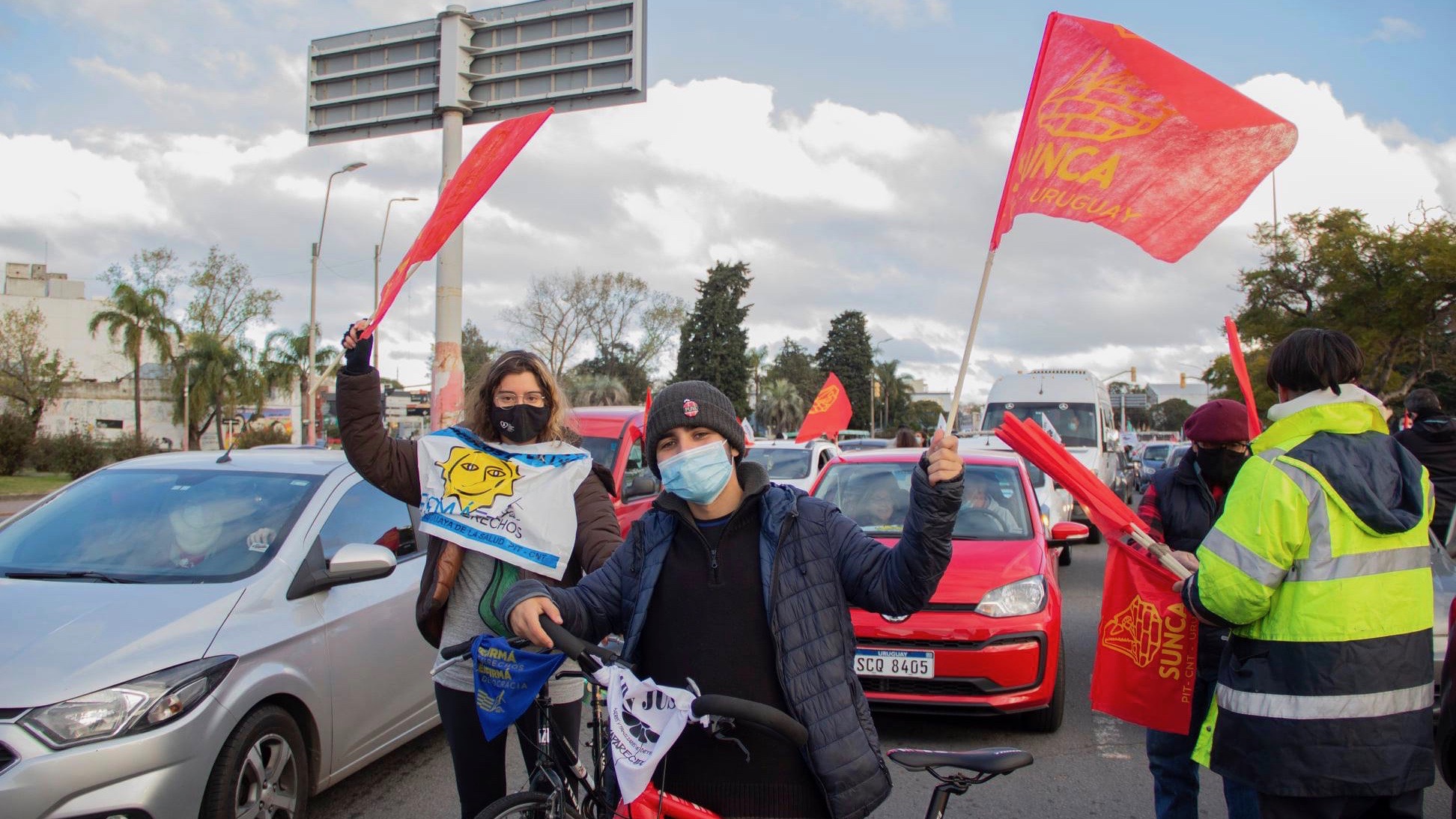Under the banner of “against hunger and inequality, for work and wages, in defense of life”, on June 17, thousands of Uruguayan workers observed a 24-hour national strike against the right-wing government of President Luis Lacalle Pou. The strike was called for by the Uruguayan union center, the Inter-Union Plenary of Workers – National Convention of Workers (PIT-CNT), to demand measures to combat the economic and social crisis generated by the COVID-19 pandemic.
Almost all sectors shut down economic activities except healthcare and transportation. The COVID-19 health centers and vaccination centers remained open and the transportation services to reach them also remained open. Throughout the day, several demonstrations were held across the country.
In the capital Montevideo, a large rally of cars, motorcycles and bicycles was carried out from different parts of the city. It ended at the Independence Plaza, where a demonstration was held. The president of the PIT-CNT Fernando Pereira, the secretary general Marcelo Abdala, and the vice president Soraya Larrosa went to the Executive Tower at the plaza to deliver a letter with the urgent demands of the mobilizing sectors to the president.
After delivering the letter, at a press conference, Abdala said that the strike was “very positive” and “overwhelming.” He stressed that “the working population and our people are going through a dramatic situation in the midst of the pandemic, with 100,000 more poor people, with unemployment and a lack of prospects.”
Regarding the letter and the demands, he said that there is a need “to take measures that reduce circulation, but accompanied by a basic emergency income. Later, invest in housing, strengthen the healthcare system, generate public purchases for development and increase salaries so that domestic demand becomes more dynamic.”
The union leader also reported that during the day thousands of signatures were collected at the 600 signature collection stations across the country to call a referendum to repeal 135 articles of the Urgent Consideration Law (LUC).
At a press conference a day before the strike, Abdala outlined why workers in Uruguay explicitly reject the LUC. He stated that the neoliberal and anti-worker law promotes budget cuts in the public sector, supports the privatization of public companies and restricts the right to strike of the workers, among other setbacks. He said that the general strike was also called to express solidarity with 15 professors from the San José department, who were dismissed from their jobs in February, for participating in the campaign to collect signatures in favor of a referendum on the LUC.
Pereira also said that “the strike is in defense of those who are having a hard time due to unbearable inequity.” He stressed that “there are over 100,000 citizens living in poverty, who eat in community kitchens installed in Montevideo and other cities of the country.” He pointed out that while a significant part of the population is struggling to meet the basic needs, some individuals, business groups and economic elites, deposit several billions of dollars abroad.
The PIT-CNT has shared the letter addressed to the president in a thread on twitter. As outlined in the letter, their demands include: a monthly basic emergency income of 440 USD and a basic basket of public services such as electricity, water, Internet and gas for a year to the vulnerable population; protection of jobs and generation of employment opportunities; increase in public investment to boost the economy; public procurement policies that support national production and employment; relaunch of the healthcare sector; a new Youth Employment Law; a national plan for productive development; access to land for small and medium rural producers; financial support for micro and small businesses; guarantees for affordable housing, a new Youth Employment Law, increase tax on rich population, increase tax on deposits abroad, no to privatization of public companies, among others.
📢𝐏𝐀𝐑𝐎 𝐆𝐄𝐍𝐄𝐑𝐀𝐋 · 𝟏𝟕/𝟔/𝟐𝟏 · un pueblo trabajador en defensa de la vida ·
Hoy paramos contra el hambre y la desigualdad.
Nos movilizamos a lo largo y ancho del país entregando nuestra plataforma a la ciudadanía y recolectando firmas#yoparo #yoparoPITCNT pic.twitter.com/GRJcCZkb3U— PIT CNT (@PITCNT1) June 17, 2021





